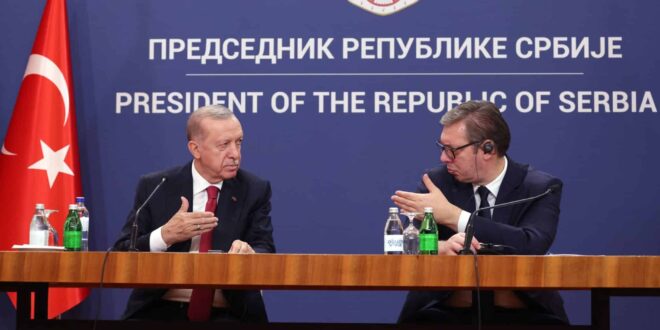Turkey was among the first to recognise Kosovo in 2008 and has since backed its efforts for wider international recognition. During the early 2010s, frequent visits between then prime minister Hashim Thaci and Erdogan deepened ties, while Turkish companies secured major stakes in Kosovo’s economy: from the airport and electricity distribution to a significant share of the banking sector.
However, Kosovo proved less cooperative on politically sensitive issues because of its fragmented political landscape. Unlike Serbia’s centralised leadership, Turkey’s relations with Kosovo have fluctuated with the country’s shifting political alliances.
Navigating Kosovo’s politics has always required engaging a variety of stakeholders. Thaci was Turkey’s primary interlocutor after the war, but his power in the 2010s was constrained compared to Vucic’s in Serbia. The growing influence of the Vetevendosje party in the opposition, Western actors and other Kosovo Liberation Army factions, notably Ramush Haradinaj’s Alliance for the Future of Kosovo party, diluted Thaci’s authority and exposed the limits of Ankara’s influence.
The 2018 deportation of six Turkish citizens, allegedly members of the Gulen movement, became a turning point. The operation, coordinated by both countries’ intelligence services, revealed Ankara’s leverage but also provoked backlash when Haradinaj, then prime minister, dismissed security officials involved. Erdogan accused Haradinaj of protecting terrorists, while Thaci, who approved the operation as president, maintained cordial ties and even attended Erdogan’s 2019 inauguration.
The incident marked both the peak and the beginning of the decline of Turkey’s personalised diplomacy in Kosovo.
As Thaci resigned to face war crimes charges in The Hague and Vetevendosje won the 2021 elections, Turkey lost key personal allies in Pristina. Its engagement became less personalised but more institutional: cooperation continued through NATO and bilateral defence channels.
Since the Russia-Ukraine war intensified in 2022, Turkey has sought to present itself as a regional stabiliser, much to Serbia’s disapproval. After violent clashes between NATO peacekeepers and Serb protesters in northern Kosovo in 2023, Ankara contributed additional troops to NATO’s Kosovo peacekeeping force, KFOR.
The following year, Turkey and Kosovo signed a military cooperation agreement, which Belgrade deems illegal under UN Security Council Resolution 1244. Pristina purchased drones and military vehicles, and agreed to establish an ammunition factory with Turkey’s state-owned Mechanical and Chemical Industry Corporation. These moves signal a shift: as Ankara’s political foothold weakened, defence cooperation became the main channel of influence.
That’s why, even though Vucic’s remarks about the drone sales to Kosovo may not have been well-received in Ankara, Turkey’s policymakers know that Serbia remains the region’s only relatively stable government they can count on for business and political cooperation.
Vucic’s outburst is best understood as an attempt to distract voters from the protests threatening his rule. His quick retraction shows that despite moments of rhetorical tension, neither side wishes to jeopardise this transactional friendship. In the long run, the pragmatic partnership between Ankara and Belgrade will endure as a friendship built on convenience rather than trust.
 Eurasia Press & News
Eurasia Press & News




